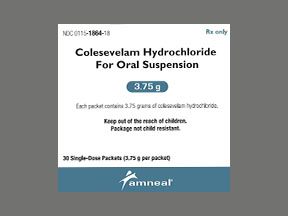
Welchol Coupons & Savings Card – Discount Prices from $54.17
Brand for: Colesevelam
My prescription
Edit
3.75GM, Colesevelam (30 Packets)
Select pharmacy

CVS
$54.17
COUPON PRICE
Albertsons
$95.33
COUPON PRICE
Walgreens
$100.50
COUPON PRICE
Walmart
$117.91
COUPON PRICEWelchol savings card
Show this card to your pharmacist
CVS
$54.17
BIN
ID
PCN
GRP
019876
LH163EA5C6
CHIPPO
LHX
Powered by
Related bile acid sequestrants prescriptions
More prescriptions for high cholesterol
Related bile acid sequestrants prescriptions
More prescriptions for high cholesterol
Price history for Welchol (brand) & Colesevelam (generic)
30 Packets, 3.75GM
Average retail price for Welchol
Average retail price for Colesevelam
Average SaveHealth price for Colesevelam
Our price history data is based on aggregated prescription data collected from participating pharmacies in America. Our prescription data updates daily to reflect the latest price changes. If you notice a missing data point, it means there wasn't sufficient data available to generate a monetary value for that date.
Over the last 12 months, the average discount price of Welchol is $203.49 using the SaveHealth savings card. That's an average savings of 74.18% on Welchol with our discount card.
*Retail prices are based on pharmacy claims data, and may not be accurate when we don't have enough claims.
Welchol (Colesevelam) dosage forms
Dosage Quantity Price from Per unit 3.75GM 30 Packets $54.17 $1.81 3.75GM 1 Packet $6.35 $6.35
| Dosage | Quantity | Price from | Per unit |
|---|---|---|---|
| 3.75GM | 30 Packets | $54.17 | $1.81 |
| 3.75GM | 1 Packet | $6.35 | $6.35 |
What is the drug Welchol used for?
Welchol is used to lower cholesterol levels, specifically low-density lipoprotein (LDL) cholesterol, and to improve glycemic control in adults with type 2 diabetes. It is often prescribed as part of a treatment plan that includes diet and exercise.
Is Welchol used to treat diarrhea?
Welchol (colesevelam) is primarily used to lower cholesterol levels and improve glycemic control in type 2 diabetes. However, it can also be used off-label to treat diarrhea, particularly bile acid diarrhea, which can occur after certain surgeries or in conditions like irritable bowel syndrome. It works by binding bile acids in the intestine, which can help reduce diarrhea symptoms. A healthcare provider should be consulted to determine if Welchol is appropriate for this use.
Does Welchol cause weight gain?
Welchol (colesevelam) is not commonly associated with weight gain. However, individual responses to medication can vary, and some people may experience changes in weight. If there are concerns about weight changes while taking Welchol, it is advisable to consult with a healthcare provider for personalized advice and management.
Does colesevelam make you gain weight?
Colesevelam is not typically associated with weight gain. It is primarily used to lower cholesterol levels and manage blood sugar in certain conditions. However, individual responses to medication can vary, and if there are concerns about weight changes, it is advisable to consult with a healthcare provider.
Who should not take Welchol?
Welchol should not be taken by individuals with a history of bowel obstruction, those with very high triglyceride levels, or individuals with a known allergy to colesevelam or any of its components. Additionally, it should be used with caution in patients with a history of pancreatitis or those with certain metabolic disorders. It is important for individuals to consult with their healthcare provider to determine if Welchol is appropriate for their condition.
